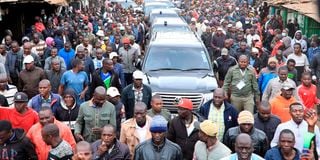The many questions inside the minds of Raila Odinga’s supporters

Azimio La Umoja Party presidential candidate Raila Odinga is welcomed by his supporters to cast his ballot during the recent general election at a polling station in Kibera, Nairobi on August 9, 2022.
What you need to know:
- The 2022 General Election was a political contest that his campaign machine metaphorically marketed as his chance to fire his last bullet.
- Odinga’s supporters cast their lot with him because of their belief that he would erect a firm guardrail around all the gains that emanated from the leftist political struggles.
- Will the UDA government alienate them insofar as resource allocation goes? Will they forever wear the ‘enemy of the state’ tag?
Too big to fail is a banking and finance theory. This theory deems certain corporations, particularly, finance institutions, to be so big that if they went under, the entire economic system would be immensely upset.
This theory gained popularity and prominence during the 2008-2009 Great Recession.
Then, President George W Bush’s regime used it to justify its decision to bail out cash-strapped corporates.
Fit this theory into the frame of the recently concluded 2022 general elections and Raila Amollo Odinga would cross your mind.
By and large, he was considered too big to be floored in the recent election.
Many were persuaded that after four unsuccessful bids to be the president of Kenya, the scales had finally tilted in his favour.
Considering his political odyssey, networks, charisma and mobilisation skills, many agreed that the battle for the presidency was his to lose.
"Last bullet"
It’s worth appreciating that for Odinga and his supporters, the 2022 election was incomparable to any other that had preceded it.
It was a political contest that his campaign machine metaphorically marketed as his chance to fire his last bullet.
But jaws dropped when, for the fifth time, his bid for the presidency came to a nought.
So, here goes a question. In the aftermath of this loss, what’s going on in the mind of a random Odinga supporter?
For the record, I am an ardent supporter of Odingaism and I, therefore, qualify to authoritatively field this question.
However, before anyone accuses me of advancing political dogmatism, let me share the logic that informs my subscription to Odinga’s leftist political cause.
For historical reasons, as soon as I was born, I became an ‘enemy of the state’. I was born in a community whose political leadership’s claim to fame lay in its tendency to ‘antagonise’ the government of the day.
A community leadership from whose lips such words as equality, freedom, progress, reforms, and good governance, among others, were never far.
These were the things in pursuit of which the young were encouraged to go.
This explains why over the years, it has been the norm rather than the exception, for the young in my community to, upon acquisition of high learning, put their intellect at the disposal of the leftist political cause.
And the cause hasn’t been devoid of gains. We have the 2010 Constitution, for instance, to show for it.
Particularly, media freedom, freedom of expression, respect for the rule of law, and political pluralism are milestones that are attributed to Odinga’s political cause.
Odinga’s supporters, therefore, have over the years cast their lot with him because of their belief that he would erect a firm guardrail around all the gains that emanated from the leftist political struggles.
This explains why as the United Democratic Alliance (UDA) formation assumes power, there are questions that hog the thoughts of a random Odinga supporter.
]Will this regime keep its word and uphold the rule of law? Will the UDA leadership ensure that devolution works?
What of corruption? Will this regime live up to Kenyans’ expectations and rid our country completely of graft?
And what of Odinga’s supporters, millions of them? Will the UDA government alienate them insofar as resource allocation goes? Will they forever wear the ‘enemy of the state’ tag?
Question
And here comes the most disturbing of all questions. How will the UDA administration address the question of national unity?
Will it constitute an exclusionist government that only offers state jobs to its supporters and sympathisers?
Certainly, it’s everyone’s hope that the UDA government will outperform itself.
To do so, however, it must now tone down political rhetoric and propaganda.
Further, it must not only focus on the attainment and sustenance of nationhood but also encourage positive tribalism.
In this respect, they should borrow a leaf from the thoughts of the late Thomas Joseph Mboya, one of Kenya’s foremost statesmen.
In his day, it was Mboya’s argument that the tribe offers security, stability and community to its membership.
Conversely, he reasoned that negative tribalism bred competition and xenophobia
. In contemporary Kenya’s context, negative tribalism entails the advancement of stereotypes.
For the welfare of nationhood, henceforth, there should be no blanket association of any Kenyan community with chaos, violence, or vandalism.
Maybe today, as was the case in Mboya’s time, any pro-positive tribalism talk can be dismissed as a product of utopia and naivety.
Whatever the case, there is no better environment for our diverse cultures to thrive than one that encourages positive tribalism.
Let us nurture the national tribe – national unity – but not at the expense of positive tribalism.
Obviously, there is one more question that constantly lingers in the mind of each Odinga supporter.
What becomes of him? Before my eyes, he is the giant tido tree that has mastered the art of cheating unfavourable climatic conditions.
There is no doubt that he’ll figure something out. Whatever it is, I assure him of my unqualified support!




